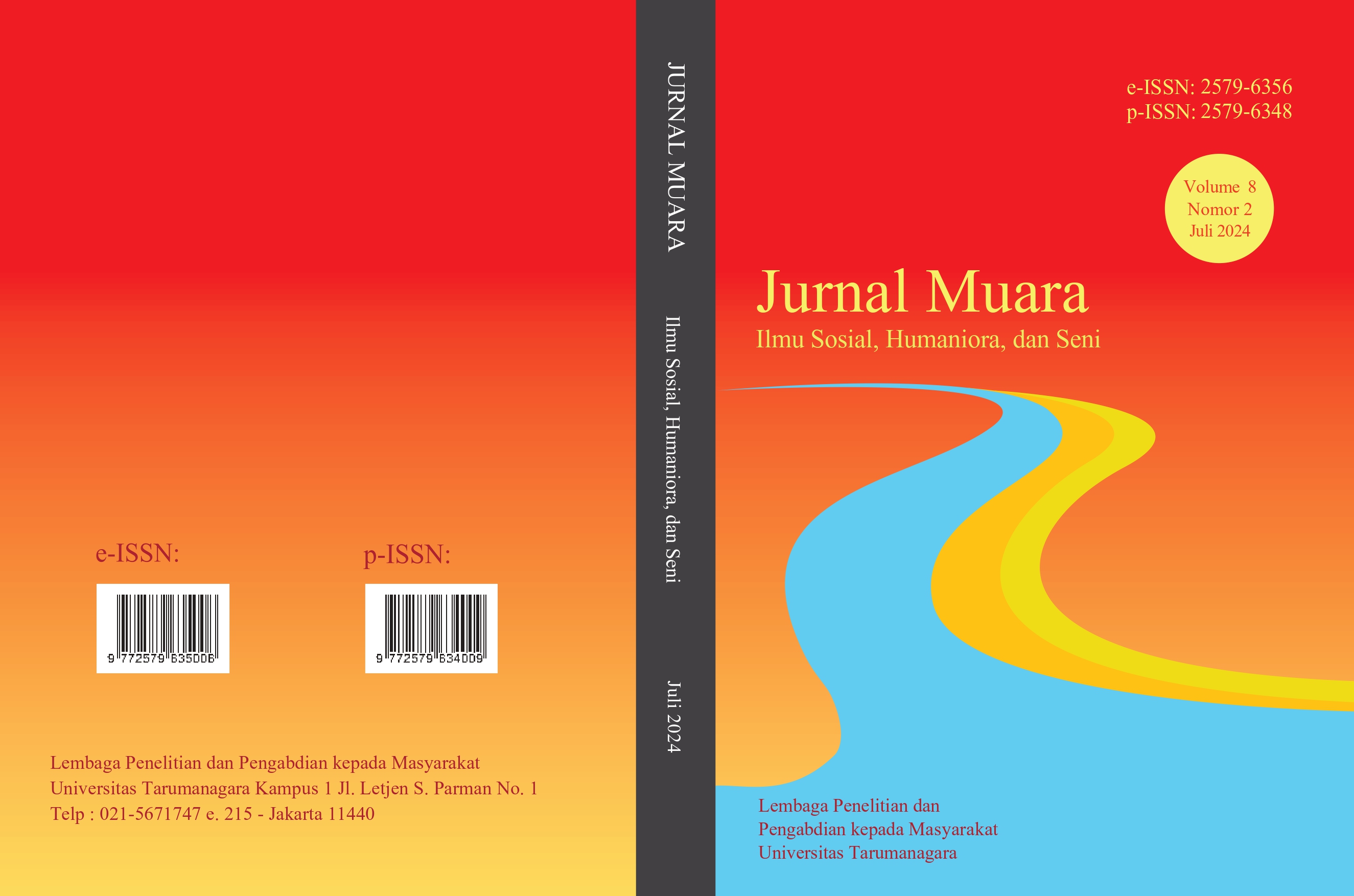PENGARUH KUALITAS KEHIDUPAN KERJA DAN MODAL PSIKOLOGIS TERHADAP KESEJAHTERAAN SUBJEKTIF PADA SALESMAN
Main Article Content
Abstract
Wabah pandemi coronavirus disease 2019 (COVID-19) di Indonesia membuat para salesman kesulitan untuk mencapai target pencapaian yang diharapkan akibat kebijakan pemerintah terkait menjaga jarak sosial. Salah satu hal yang dapat mempertahankan kinerja para salesman adalah dengan memerhatikan kesejahteraan subjektifnya. Terdapat dua faktor yang dapat memengaruhi kesejahteraan subjektif, yaitu kualitas kehidupan kerja dan modal psikologis. Oleh karena itu, tujuan dari penelitian ini adalah untuk mengetahui pengaruh kualitas kehidupan kerja dan modal psikologis terhadap kesejahteraan subjektif pada salesman. Penelitian dilakukan secara kuantitatif dengan partisipan sebanyak 126 salesman dari seluruh Indonesia. Proses pengambilan data dilakukan secara daring selama bulan Maret hingga Mei 2022. Penelitian ini menggunakan empat alat ukur berupa kuesioner untuk mengukur setiap dimensinya. Satisfaction With Life Scale (SWLS) dan The Positive and Negative Affect Schedule (PANAS) digunakan untuk mengukur variabel kesejahteraan subjektif. Dalam mengukur kualitas kehidupan kerja, peneliti menggunakan Walton’s QWL Model dan dua dimensi tambahan dari alat ukur yang dikembangkan oleh Rostiana et al. (2015). Sedangkan, Psychological Capital Questionnaire (PCQ) digunakan untuk mengukur variabel modal psikologis. Berdasarkan hasil analisis data menggunakan metode regresi linear berganda ditemukan tiga hal. Pertama, bahwa kualitas kehidupan kerja (β = 0.343, p < 0.05) memengaruhi kesejahteraan subjektif. Selain itu, modal psikologis (β = 0.523, p < 0.05) juga memengaruhi kesejahteraan subjektif. Kualitas kehidupan kerja dan modal psikologis secara bersama – sama berperan sebesar 50.6% (p < 0.05) terhadap kesejahteraan subjektif.
Article Details
Section

This work is licensed under a Creative Commons Attribution-NonCommercial-ShareAlike 4.0 International License.
This work is licensed under a Jurnal Muara Ilmu Sosial, Humaniora, dan Seni Creative Commons Attribution-ShareAlike 4.0 International License.References
Herjanto, H., & Franklin, D. (2019). Investigating salesperson performance factors: A systematic review of the literature on the characteristics of effective salespersons. Australasian Marketing Journal, 27(2), 104–112. https://doi.org/10.1016/j.ausmj.2018.12.001
Saragi, D. D. S., & Saragih, L. (2019). Peranan sales promotion representative terhadap volume penjualan shinzui pada pt. focus distribusi nusantara. Manajemen: Jurnal Ekonomi, 1(1), 49–57.
Chaker, N. N., Nowlin, E. L., Walker, D., & Anaza, N. A. (2021). Alone on an island: A mixed-methods investigation of salesperson social isolation in general and in times of a pandemic. Industrial Marketing Management, 96, 268–286. https://doi.org/10.1016/j.indmarman.2021.05.009
de Neve, J., Diener, E., Tay, L., & Xuereb, C. (2013). The objective benefits of subjective well-being. CEP Discussion Paper No 1236, 1–35.
Diener, E., & Chan, M. Y. (2011). Happy people live longer: Subjective well-being contributes to health and longevity. Applied Psychology: Health and Well-Being, 3(1), 1–43. https://doi.org/10.1111/j.1758-0854.2010.01045.x
Diener, E. (1984). Subjective well-being. Psychological Bulletin, 95(3), 542–575.
Watson, D., Clark, L. A., & Tellegen, A. (1988). Development and validation of brief measures of nositive and Negative affect: The PANAS scales. Journal of Personality and Social Psychology, 54(6), 1063–1070.
Brown, T. T. (2015). The subjective well-being method of valuation: An application to general health status. Health Services Research, 50(6), 1996–2018. https://doi.org/10.1111/1475-6773.12294
Luthans, F., Youssef, C. M., & Avolio, B. J. (2007). Psychological capital: Developing the human competitive edge. Psychological Capital: Developing the Human Competitive Edge. Oxford Unicersity Press.
Darvishmotevali, M., & Ali, F. (2020). Job insecurity, subjective well-being and job performance: The moderating role of psychological capital. International Journal of Hospitality Management, 87. https://doi.org/10.1016/j.ijhm.2020.102462
Gan, Y., & Cheng, L. (2021). Psychological capital and career commitment among chinese urban preschool teachers: The mediating and moderating effects of subjective well-being. Frontiers in Psychology, 12. https://doi.org/10.3389/fpsyg.2021.509107
Baidun, A., Shaleh, A., Miftahuddin, M., Luzvinda, L., & Muhtar, D. (2020). Effect of psychological capital and gratitude on subjective well-being young mother of hijrah communities in Jakarta. International Conference on Religion and Mental Health. https://doi.org/10.4108/eai.18-9-2019.2293469
Ko, M. C. (2021). An examination of the links between organizational social capital and employee well-being: Focusing on the mediating role of quality of work life. Review of Public Personnel Administration, 41(1), 163–193. https://doi.org/10.1177/0734371X19865996
Timossi, L. D. S., Pedroso, B., Francisco, A. C. De, & Pilatti, L. A. (2008). Evaluation of quality of work life: An adaptation from the walton’s qwl model. XIV International Conference on Industrial Engineering and Operations Management.
Avci, N. (2017). The relationship between coworker supports, quality of work life and wellbeing: An empirical study of hotel employees. International Journal of Management Economics and Business, 13(3), 577–589. https://doi.org/10.17130/ijmeb.2017331328
Fernandes, R. B., Martins, B. S., Caixeta, R. P., Da Costa Filho, C. G., Braga, G. A., & Marcelo, A. L. (2017). Quality of Work Life: An evaluation of Walton model with analysis of structural. Espacios, 38(3).
Slocum, J. W. (1981). Job redesign: Improving the quality of work life. Journal of Experiential Learning and Simulation, 3, 17–36.
Suyasa, P. T. Y. S. (2017). The role of quality of work life as a predictor of counterproductive work behavior. ANIMA Indonesian Psychological Journal, 32(3), 169–183. https://doi.org/10.24123/aipj.v32i3.631
Filianti, S., Suyasa, P. T. Y. S., & Winata, W. B. (2016). Analisis dimensi-dimensi quality of work life terhadap subjective well-being. Proceeding Forum Ilmiah Psikologi Indonesia, February 2017, 227–233.
Liswandi. (2013). Kualitas kehidupan kerja: Suatu kajian literatur. Jurnal Lentera Bisnia, 2(1), 101–113.
Singhal, H., & Rastogi, R. (2018). Psychological capital and career commitment: The mediating effect of subjective well-being. Management Decision, 56(2), 458–473. https://doi.org/10.1108/MD-06-2017-0579
Maulida, D., & Shaleh, A. R. (2017). Pengaruh modal psikologis dan totalitas kerja terhadap kesejahteraan subjektif. Psikohumaniora: Jurnal Penelitian Psikologi, 2(2), 107–124.
Friend, S. B., Johnson, J. S., Luthans, F., & Sohi, R. S. (2016). Postive pyschology in sales: Integrating psychological captial. Journal of Marketing Theory and Practice, 24(3), 306–327. https://doi.org/10.1080/10696679.2016.1170525
Dewi, L., & Nasywa, N. (2019). Faktor-faktor yang mempengaruhi subjective well-being. Jurnal Psikologi Terapan Dan Pendidikan, 1(1), 54–62. https://doi.org/10.26555/jptp.v1i1.15129
Bhattarai, M., Jin, Y., Smedema, S. M., Cadel, K. R., & Baniya, M. (2021). The relationships among self‐efficacy, social support, resilience, and subjective well‐being in persons with spinal cord injuries. Journal of Advanced Nursing, 77(1), 221-230.
Abdullah, S. M. (2019). Social cognitive theory: A Bandura thought review published in 1982-2012. Psikodimensia, 18(1), 85-100.
Reid, A. (2004). Gender and sources of subjective well-being. Sex Roles, 51(11/12), 617–629. https://doi.org/10.1007/s11199-004-0714-1
